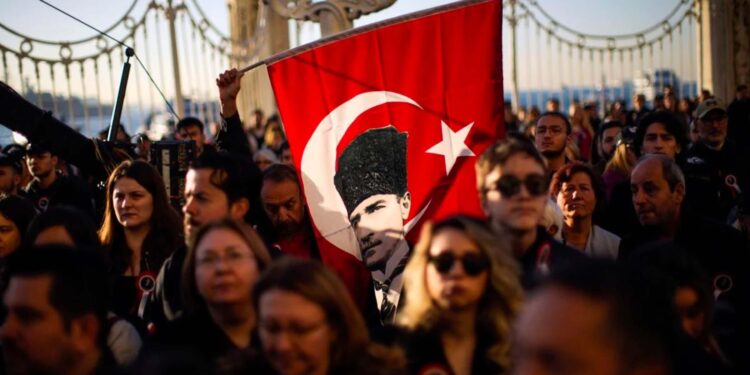by Miceál O’Hurley
ISTANBUL — 10 November is always reserved as a special day by the Türkish people to celebrate the father of the modern State – Mustafah Kemal Pasha – known affectionately and reverently as ‘Ataturk’ (father of Türks). The anniversary of his death is observed with a peculiar mix of reverence and celebration throughout Türkiye. Even in Dublin the Embassy staff paid tribute to Ataturk as their missions do throughout the world. In an age when tradition and institution mean remarkably less than they did only a few-short-years-ago, 10 November remains a fervent memorial to a man whose fingerprints can still be found in modernity.
To understand Türkiye’s reverence for Ataturk it is necessary to understand the world into which he matured and began his life of service. While he rose to prominence after the Battle of Gallipoli where his daring and leadership led Ottoman Turkey to victory over allied forces his stature was cemented after the fall of the Ottoman Empire. Resisting Allied efforts to partition Türkiye, Ataturk established a Government at Ankara and began laying a foundation for a secular, democratic State. The transformation from region of empire to a modern State was not easy. Industrialisation, poverty, education and a secular ethic would be hard-won victories achieved incrementally over-time. And yet despite all odds, Ataturk’s leadership and vision paid-off. And to ask why Türkiye remained steadfastly secular and democratic while the rest of Europe devolved into fascism one must conclude it was Ataturk’s guiding vision for the State and his personal ability to instill hope into the population.
By any measure, the foundation which Ataturk laid and nurtured has resulted in Türkiye having prevailed. Like any modern democracy it has its problems and its critics. For the far-right there is too much secularism. For others, not enough progress has been made on social issues. Economists complain Türkiye has taken the wrong path and yet as the rest of the world slips into the economic malaise that began in Türkiye earlier than elsewhere such criticism seems resoundingly out-of-step with the global reality of universal inflation, stagnation and declining purchasing power and wages.
The real measure of Türkiye’s success as a democratic State has come to fore in the aftermath of Russia’s invasion of Ukraine. Türkiye, having nurtured ambitions to enjoy a greater regional role has stepped large onto the world stage as an international player of import. Türkiye’s rapport with the West and the East was on fully view when at the 2022 Antalya Diplomacy Forum they brought together the Foreign Ministers of Russia and Ukraine in the very early days of Russia’s expanded invasion of the Ukrainian heartland. While Lavrov and Kuleba did not reach an accord (the issue was not ripe for settlement and isn’t still 10-months later) Türkiye demonstrated it was to be taken seriously as an arbiter for peace and stability. The dogged determination of Türkiye to make a difference paid-off when against all expectations Ankara brokered a deal between Russia and Ukraine to lift the blockade of portal vital to Ukraine grain shipments. In so doing, Türkiye helped avert a much harsher landscape for food insecurity around the globe. And, when Russia unilaterally announced a withdrawal from the deal it was again Türkiye who brought parties to the table.
Ataturk might well be surprised at how his efforts brought about a modern Türkish State playing an oversized role in global and regional security. And while there is much to criticize about the state of the Türkish economy, any visitor to Türkiye must marvel at how its infrastructure investments over the past 20-years has modernised the State and keeps it positioned for further economic success. And while others make complain Türkiye is un-democratic it failing to so far voice its assent for Sweden and Norway to join NATO, it has not said no and continues to urge the two aspirant nations to give voice to the EU’s decision along with the United States to recognise the Kurdish Worker’s Party (PKK) as a terrorist organisation and extradite its members enjoying protection in Sweden and Norway to face justice. This is the dialogue of diplomacy and mature States and must be seen in this context.
Ataturk needs no hagiography and this is not one. However, any observer of modern politics, statecraft and diplomacy must unequivocally recognise that 84-years after the death of the ‘Father of the Turks’ Ataturk still enjoys a remarkable reverence and awe that transcends any cult-of-personality. In an age of transactionalism and populism it is worth contemplating why Ataturk and his vision still resonate in modernity when such admiration has long-since dissipated from the persona of George Washginton, Simon Bolivar, Charles DeGaul and others who led there nations onto a new path of democracy. The answer may lie not only in the man and his work in creating a secular and democratic State, how it has endured and now come into a maturity that is crafting a new and hopefully better world where the respect of smaller States can command the cooperation of larger States, even those locked in a disturbingly vicious war where the international rule of law is at stake.
















































